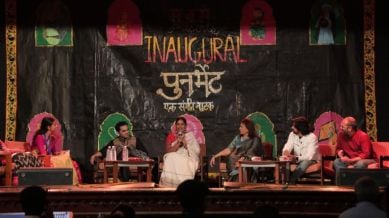Stay updated with the latest - Click here to follow us on Instagram
Campus Talk: Evolving through 102 years, how Marathi Vangmay Mandal at Mumbai’s St Xavier’s College is breaking language, cultural barriers
Marathi Vangmay Mandal, that was traditionally a space for Marathi-speaking students to bond over literature, has transformed its identity to welcome diversity, actively encouraging students from non-Marathi backgrounds to participate.

At Mumbai’s St Xavier’s College, even non-Marathi speaking students join in singing the Marathi language pride song ‘Labhale Amhas Bhagya, Bolto Marathi’ — a rare sight in an age of fragmented cultural identities. Behind this inclusive celebration of language is the Marathi Vangmay Mandal (MVM), which is now marking its 102nd year as one of the oldest student-led cultural groups in a city’s college.
Over the years, this student-led cultural body has been able to foster a love for the Marathi language among students across linguistic backgrounds. As the MVM held its inaugural function on Tuesday, its members and faculty reflected on how the Mandal has evolved to remain relevant, inclusive, and vibrant.
monthly limit of free stories.
with an Express account.
“For many of us, joining MVM happened by chance,” said core committee member Rutvi Chaudhari, who has been with MVM for nearly five years. “I joined when I was a fresher Class 11 student, because it was the only cultural group open to students from Junior College. But soon, it became a major part of my college life — especially when I saw its impact on non-Marathi speaking students,” Chaudhari said.
According to Chaudhari, who is a Marathi-speaking individual, MVM offers students a platform to engage not just with the language, but also with Maharashtra’s wider cultural landscape. “We have many outstation students who join MVM to understand and navigate the culture of Maharashtra,” she said.
The MVM goes beyond the written word by organising various performing arts events, including plays, traditional folk music, and dance. “These art forms offer an accessible and engaging way to introduce students to Marathi culture. For example, a Lavani performance gives insight into the state’s folk traditions, while a Koli song opens a window into the lives of Mumbai’s original fishing communities,” Chaudhari explained.
MVM was traditionally a space for Marathi-speaking students to bond over literature. Over time, it has transformed its identity to welcome diversity, actively encouraging students from non-Marathi backgrounds to participate. Apart from publishing magazines, it holds various events to make it a more engaging and attractive experience for participants.
Dr Rajendra Shinde, former principal of the college and an MVM alumnus from 1980, has witnessed this evolution firsthand. “When I joined as a student, MVM felt like home — a space where I could speak the language I was most comfortable in. Later, as a professor and faculty-in-charge, I saw the group embrace new forms — from literary events to music and film-related programmes, even inviting well-known Marathi cinema and television personalities. Today, the management committee of MVM includes multiple non-Marathi speakers, all united in their mission to preserve and promote the Marathi language among their peers,” Shinde said.
Alysa Harrison, a member of MVM who is a non-Marathi speaking student at St Xavier’s College, said, “When I thought of Marathi culture, I only knew of films like Sairat. But through MVM, I discovered how much more there is”. Harrisson, who has been associated with MVM for almost three years now, feels her connection only grew stronger. “You may not understand all words of a song, but there is so much more to the song than just lyrics – the tone, the sound, the music – which connects you to the language and the culture,” she said.
“After all, the path to literature begins with an introduction to the language and its culture,” said Prof Prashant Ratnaparakhi, the current faculty-in-charge of MVM. “Last year, I saw the entire MVM team — including non-Marathi speaking members — standing together and singing the Marathi language pride song. Until then, it was just a recorded track played at all MVM events. That moment showed the real impact of student activities such as MVM,” Prof Ratnaparakhi added.